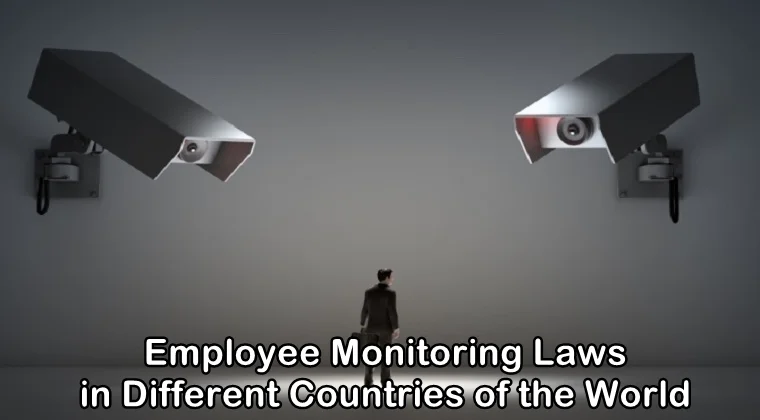Employee Monitoring Laws in Different Countries of the World

Certainly, monitoring solutions have become an integral part of every organization now. There is hardly any employer who is not using monitoring tools in his company. Different types of employee monitoring tools are being used in the workplace.
However, before deploying monitoring tools in your workplace, you must learn about employee monitoring laws that exist in your country. You need to know about the employee monitoring laws that are applicable in your country so you can find out whether or not employee monitoring is legal and if it is then to what extent.
You need to ask yourself a couple of questions before installing monitoring tools such as do you require your employees’ consent to monitor their devices? Is it compulsory to notify them about monitoring tools?
Countries have different employee monitoring laws and regulations. If we happen to look at them, we come to find out employee monitoring is legal in those countries. However, in some countries, you need the consent of your employee before you can monitor their devices whereas in some you can only monitor their emails and not keystrokes.
Employee Monitoring Laws in Different Countries
Every other company is now conducting different employee monitoring practices so they can protect the company from a major data breach. If you want to monitor your employees, then you need to know about your country’s employee monitoring laws.
Let us discuss employee monitoring laws operating in different countries.
Employee Monitoring in the US
Generally, employers are allowed to monitor employees’ equipment. However, they are not allowed to monitor their personal emails. Different employee monitoring laws are applicable in different states of the US.
In some of the states, employers need to inform their employees about the employee monitoring software before using it whereas in others the companies are allowed to track their employees without getting their consent.
Employee Monitoring in EU
It has been found out that the EU does not follow any specific laws and regulations related to employee monitoring. So, for reference, most companies in the EU use the General Data Protection Regulation (GDPR).
The GDPR requires employers to get consent from their employees before they can start monitoring their activities. In the EU, employers can also track employees based on legitimate interest by performing a legitimate interest assessment and having justified reasons to process the data without consent.
Employers also need to perform a Privacy Impact Assessment before they can implement the employee monitoring software.
Employee Monitoring in Australia
When we talk about Australian employee monitoring laws, we come to realize that they are a bit complicated than in other countries. In most cases, the employer has permission to install monitoring software on the devices of their employers to monitor their activity.
In addition to that, employees should be informed that their activity will be monitored. At least two weeks before installing the software, the employer should inform their employees about it.
Employee Monitoring in India
According to India’s employee monitoring laws and regulations, every employer has the right to monitor their employees’ activities, work emails, computers, cell phones, as well as headsets. The companies can monitor employees’ activities to protect the company’s sensitive and private information.
The companies can create different policies to inform their employees about monitoring. If, in any case, an employee finds out that the monitoring is going beyond company premises and is beginning to violate their privacy, he can ask the employer to justify such monitoring.
Employee Monitoring in Canada
It is very easy to understand Canadian employee monitoring laws because they are quite clear. Employers should inform their employees what personal data they will be collecting, using, and disclosing.
All employees and staff workers should be informed of everything about policies related to web browsing history, emails, as well as telephone use. They should also be notified if they will be monitored on a random or continuous basis.
Employee Monitoring in UAE
The employee monitoring laws operate a bit differently in the United Arab Emirates. The law permits employers to track the company’s premises including computers, cell phones, emails, other electronic devices, keystrokes, etc. However, the employees need to be fully aware of all the monitoring practices and should also give their consent.
The federal laws of the UAE protect employees as they have the right to their personal privacy. If they do not want their employers to access their personal data, then the employers can’t monitor them.
Employee Monitoring in Malaysia
In Malaysia, if the work equipment including computers and cellphones belong to the company, then the employer has every right to monitor employee’s activity during working hours such as their emails, phone calls, text messages, as well as general use of devices given to them for work purposes.
The employers should hand over a written notice both in English and Malay to inform their employees about employee monitoring. They should also tell them which personal data of them will be collected and for how long they are going to keep it, etc.
If your company is based on any other country which has not been listed above and you want to know about the laws of employee monitoring in your country, you need to check with your legal team.








